You might know Tulsi Gabbard as a former U.S. Congresswoman, a 2020 presidential candidate, and a military veteran. She broke barriers as the first Samoan and Hindu American in Congress and served in Iraq and Kuwait. Gabbard has been a vocal advocate for social justice, anti-interventionist foreign policy, and environmental issues. Recently, she switched from the Democratic to the Republican Party and was appointed Director of National Intelligence. Her story continues to influence American politics and culture—there’s much more to explore.
Key Takeaways
- Tulsi Gabbard served as a U.S. Representative from Hawaii from 2013 to 2021 and was a 2020 Democratic presidential candidate.
- She is known for her anti-interventionist foreign policy stance and advocacy for diplomacy over military force.
- Gabbard transitioned from the Democratic to the Republican Party, supporting Donald Trump’s policies and endorsing his campaign efforts.
- She made history as the first Hindu and Samoan American elected to Congress, and as a combat veteran serving in Iraq and Kuwait.
- In 2025, she was nominated and confirmed as Director of National Intelligence, becoming the first female combat veteran to hold the position.
Early Life and Military Service

Tulsi Gabbard was born on April 12, 1981, in Leloaloa, American Samoa, into a diverse family with roots in Samoa, Germany, England, Ireland, and Scotland. Growing up in Hawaii, she was raised by parents who ran a vegetarian restaurant, The Natural Deli, in Moiliili. Her family’s religious diversity, including her father’s Catholic faith and her mother’s Hinduism, influenced her early life. During her teenage years, she adopted Hinduism, inspired by her mother’s faith, and learned the value of karma yoga. In 2003, you joined the Hawaii Army National Guard amid the Iraq conflict. You served as a medical specialist in Iraq (2004–2005), earning a Combat Medical Badge. Later, you trained as an Army Military Police officer, deploying to Kuwait (2008–2009) and rising to the rank of major. Additionally, her exposure to various cultural and spiritual backgrounds helped shape her perspective on diversity and inclusivity in her public service.
Political Rise in Hawaii and Congressional Achievements
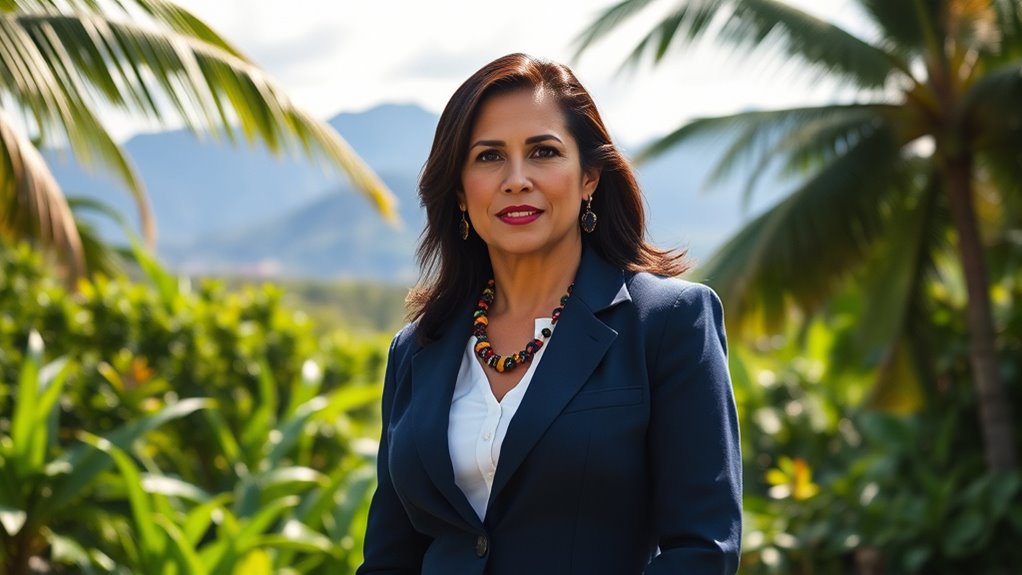
At just 21 years old, she made a remarkable entry into Hawaii politics by winning a seat in the State Legislature, becoming the youngest legislator in the state’s history. She represented District 42 in West Oahu from 2002 to 2004, but her service was interrupted by military deployments. After returning, she won a seat on the Honolulu City Council in 2010, where she championed local issues like supporting small businesses by easing parking restrictions for food trucks and addressing homelessness through Bill 54. Her political rise continued in 2012 when she won Hawaii’s 2nd congressional district, defeating five challengers. As the first Hindu and American Samoan in Congress, she gained national recognition, was endorsed by President Obama, and became a prominent voice on foreign policy and veteran affairs. Additionally, she utilized her platform to advocate for military and foreign policy reforms, leveraging her unique background as a combat veteran. Her involvement in foraging initiatives has also highlighted her commitment to sustainable practices and environmental conservation.
Key Legislative Initiatives and Advocacy
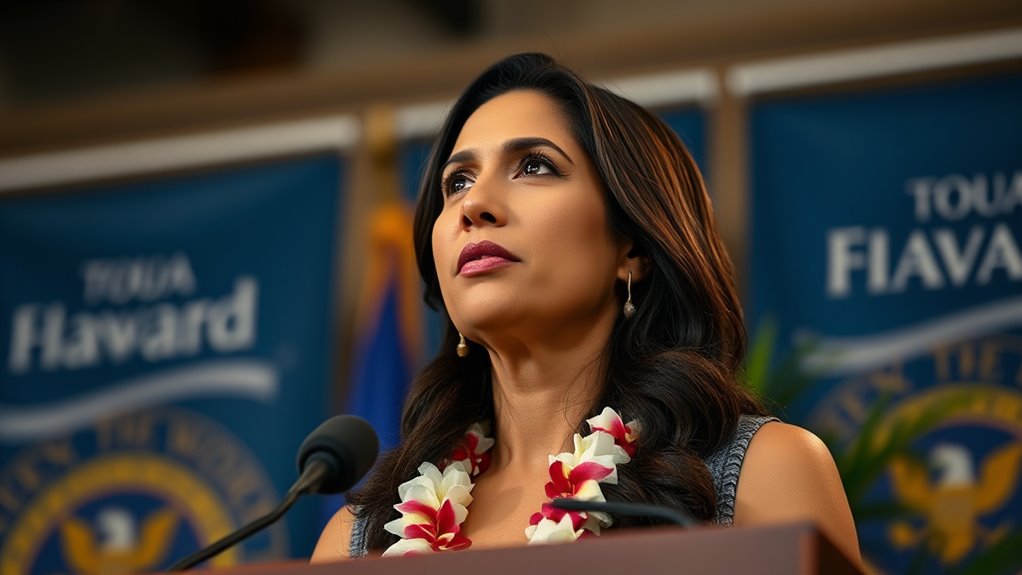
Building on her commitment to serving her community and country, Gabbard has championed a range of legislative initiatives aimed at addressing pressing social, environmental, and democratic issues. She introduced *Talia’s Law* in 2015 to prevent child abuse and neglect on military bases, which became law in 2016, emphasizing accountability in military family welfare. In 2017, she proposed the *Off Fossil Fuels (OFF) Act* to accelerate a transition to 100% clean energy by 2035, reducing carbon emissions and promoting sustainability. Gabbard also pushed for election security through the *Securing America’s Election Act* in 2018, advocating paper ballots to ensure transparency. Additionally, she supported criminal justice reform with the *First Step Act*, opposed private prisons, and championed disability rights by co-sponsoring bills that enhance resources and protections for disabled individuals. Strengthening conflict resolution skills and encouraging open dialogue are crucial for fostering effective cooperation in legislative efforts.
Stances on Foreign Policy and National Security
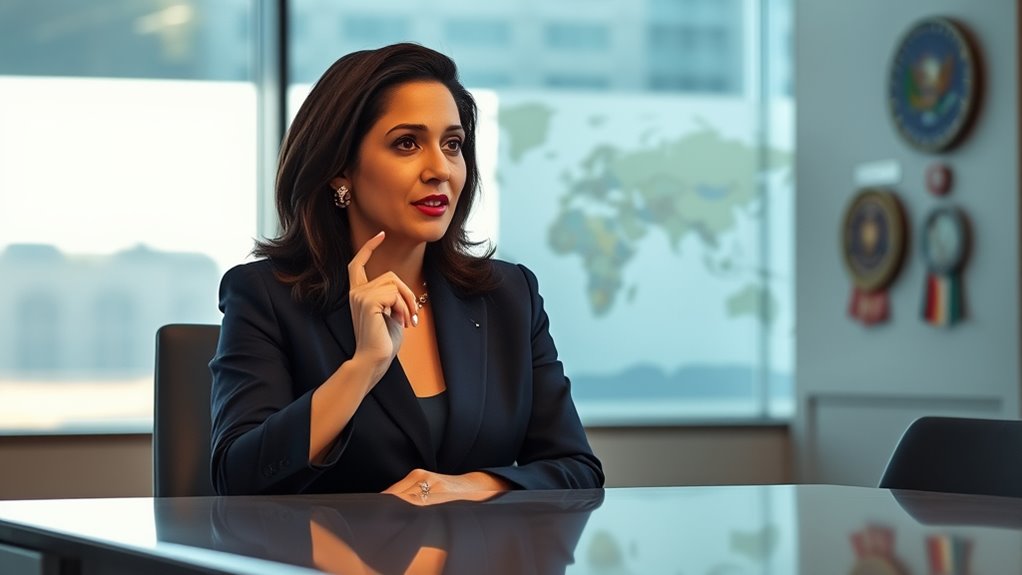
You might notice that Tulsi Gabbard favors a non-interventionist approach, opposing U.S. military efforts aimed at regime change and broad conflicts. She pushes for diplomacy and reducing military presence abroad, even meeting with controversial leaders like Bashar al-Assad. Her focus on intelligence integrity and limiting presidential war powers reflects her belief in cautious, accountable foreign policy. She also advocates for congressional oversight to prevent unauthorized military actions and promote transparency. Additionally, emphasizing AI security concerns highlights her interest in preventing technological vulnerabilities from being exploited in national security contexts.
Non-Interventionist Approach
Tulsi Gabbard champions a non-interventionist approach to foreign policy, emphasizing diplomacy over military force to address international conflicts. You’re encouraged to prioritize communication, negotiation, and goodwill, aiming to avoid “gunboat diplomacy.” She supports direct talks with adversaries, praising efforts like Trump’s negotiations with North Korea and her meeting with Bashar al-Assad. Gabbard advocates for reducing tensions with nuclear powers like Russia through treaties such as INF, questioning the U.S.’s role as a global leader. She believes avoiding escalation is key, criticizes regime change, and favors humanitarian aid without internal interference. Her approach emphasizes a U.S.-first stance, reducing military presence worldwide, and engaging adversaries through dialogue, challenging traditional interventionist policies to promote global stability and protect American interests. Incorporating protective styling benefits from crochet techniques, she emphasizes the importance of careful diplomacy that preserves stability and minimizes harm.
Opposition to Foreign Wars
Why do some leaders persist with costly and destabilizing regime change wars? These interventions, often justified as promoting democracy, frequently backfire, destabilizing regions and empowering hostile groups. You see, they drain American lives and resources without clear benefits to national security. Tulsi Gabbard strongly opposes such wars, criticizing them for ignoring diplomatic solutions and violating constitutional checks—she advocates for congressional approval before military action. Instead, she champions diplomacy, even with adversaries like Russia and China, emphasizing negotiation over conflict. Gabbard has proposed legislation to limit presidential war powers and reduce U.S. military presence abroad. She warns that endless intervention fuels anti-American sentiment and terrorism, urging a shift toward peaceful engagement and a focus on domestic priorities rather than endless foreign conflicts. She also highlights the importance of respecting constitutional procedures to prevent unchecked executive military actions. Moreover, she emphasizes the need for diplomatic efforts to resolve conflicts peacefully and the importance of transparency and accountability in military decisions.
Focus on Intelligence Integrity
In her approach to foreign policy, Tulsi Gabbard emphasizes the importance of maintaining integrity within U.S. intelligence and military decision-making. She advocates for strong congressional oversight, sponsoring amendments to limit presidential war powers and introducing the “No More Presidential Wars Act” to prevent unauthorized conflicts. Gabbard criticizes the influence of an “elitist cabal of warmongers” within Washington, warning against the nuclear escalation risks caused by hawkish policies toward China and Russia. She supports diplomacy over military intervention, calling for summits with adversaries like China and Russia to reset relations. Gabbard condemns unconstitutional acts like the assassination of Iranian General Soleimani and highlights the need for oversight to protect democratic principles, emphasizing that intelligence and military actions should align with constitutional checks and balances. Additionally, she stresses the importance of understanding the intelligence behind foreign policy decisions to prevent unnecessary conflicts.
Leadership Roles Within the Democratic Party
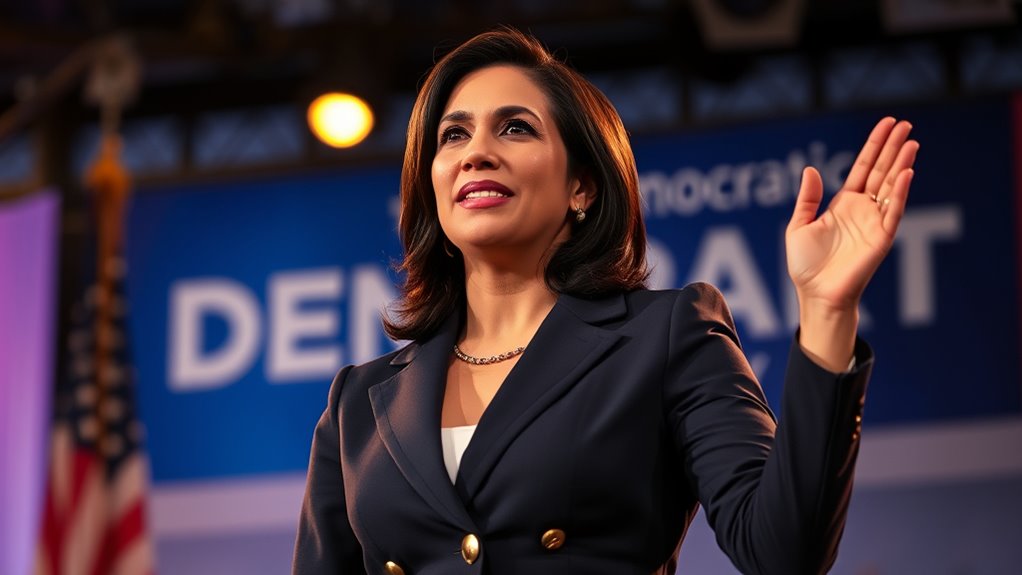
How did Tulsi Gabbard’s leadership roles within the Democratic Party shape her influence and reputation? Serving as a U.S. Representative for Hawaii’s 2nd District from 2013 to 2021, she gained significant legislative experience and served on key committees like Foreign Affairs and Armed Services. As Vice Chair of the DNC from 2013 to 2016, she influenced party policy, especially on military and foreign policy issues. Her outspoken anti-interventionist stance set her apart from mainstream Democrats, fueling intra-party debates and criticism of war policies. During the 2020 primaries, she challenged establishment views, drawing support from anti-war voters but also facing backlash. Her willingness to dissent publicly and push alternative policies earned her a reputation as an independent voice, ultimately leading to her departure from the Democratic Party in 2022. Her leadership positions allowed her to shape policy discussions and demonstrate her commitment to her principles, which resonated with a dedicated segment of the Democratic base. Her approach to party influence exemplifies how individual leadership can impact broader political narratives.
2020 Presidential Campaign and Political Shift

Tulsi Gabbard’s presidential campaign in 2020 marked a significant shift in her political trajectory, highlighting her departure from traditional Democratic positions. Her platform emphasized anti-interventionist foreign policy, criticizing U.S. confrontations with China and Syria, and advocating cooperation over conflict. Domestically, she championed renewable energy, ending fossil fuel subsidies, and reforming healthcare. Despite her notable debate appearances, her polling stayed low, and she dropped out in March 2020, endorsing Biden. Her campaign reflected a populist, non-establishment stance, diverging from mainstream Democratic views. This shift foreshadowed her later critique of party orthodoxy. She championed cooperation with rivals and challenged big industry interests, setting a foundation for her evolving political identity. Additionally, her approach to ethical implications of AI decisions underscores her broader interest in policy and governance.
Transition to the Republican Party
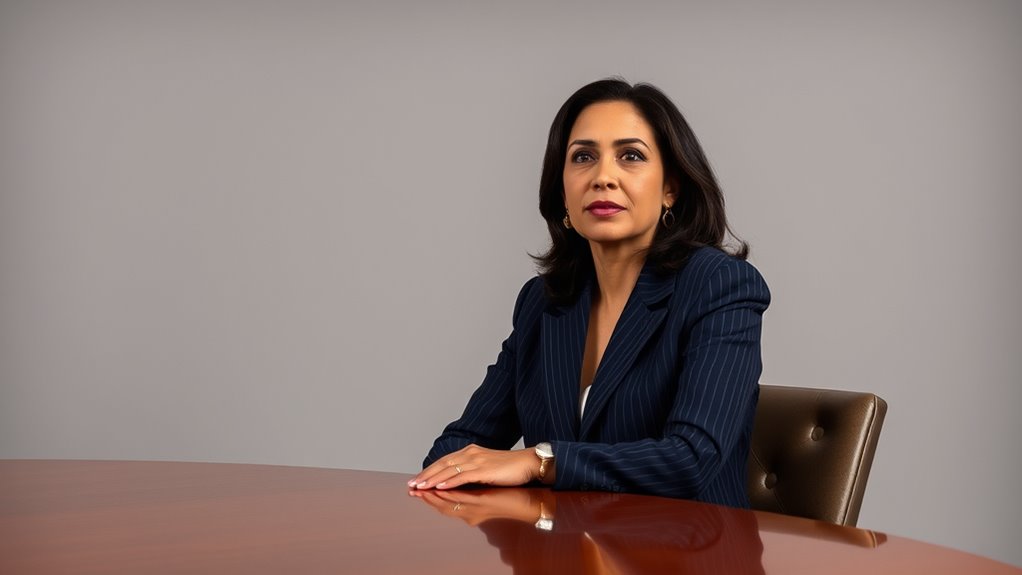
You might notice Tulsi Gabbard’s shift in political alliances, moving from Democrat to Republican, which signals a significant realignment on her part. She cites concerns about Democratic leadership and ideological changes as key reasons for her switch. This change highlights her desire to align with a party she believes better reflects her values and vision for America. Her endorsement of Trump and her public support for his policies further underscore her commitment to this new political direction.
Shift in Political Alliances
Recently, Tulsi Gabbard made a significant shift by switching from the Democratic Party to the Republican Party, marking a notable realignment in her political stance. You might see this move as a reflection of her growing dissatisfaction with the Democratic Party’s direction, which she believes has drifted from its core principles. Gabbard has publicly supported Trump and endorsed Republican candidates aligned with his vision, including at CPAC and during his re-election campaign. She’s been active as a surrogate, speaker, and honorary co-chair for Trump’s team. Her announcement at a North Carolina rally signals her commitment to the GOP. This shift not only alters her political alliances but also influences party dynamics, potentially inspiring others to reconsider their affiliations as she aligns more closely with Trump’s policies. Her endorsement in August 2024 was a major headline, highlighting her transition and the impact of her new political alignment. Additionally, her move underscores the influence of political realignment in shaping contemporary party strategies and voter perceptions.
Reasons Behind Party Switch
The decision to switch from the Democratic Party to the Republican Party stems from deep disagreements with the current ideological direction of the Democrats. You see, the Democratic Party now emphasizes identity politics, censorship, and pro-war policies, which clash with your values of freedom and peace. You’re troubled by their reliance on political elites and figures like Cheney, whose warmongering contradicts your stance against unnecessary conflict. This shift aligns with the Republican Party, which champions individual liberties, traditional American values, and non-intervention abroad. The table below highlights these differences:
| Democratic Party | Republican Party |
|---|---|
| Embraces woke culture and identity politics | Focuses on individual freedoms and equality |
| Accused of pro-war and censorship | Advocates for peace and free speech |
| Controlled by political elites like Cheney | Positions itself against establishment warmongers |
| Supports policies seen as against liberty | Prioritizes core American values |
| Endorsed by figures like Cheney, seen as betrayal | Seen as more consistent with your principles |
| Relies heavily on identity politics to mobilize voters | Focuses on uniting Americans around shared values |
Appointment as Director of National Intelligence
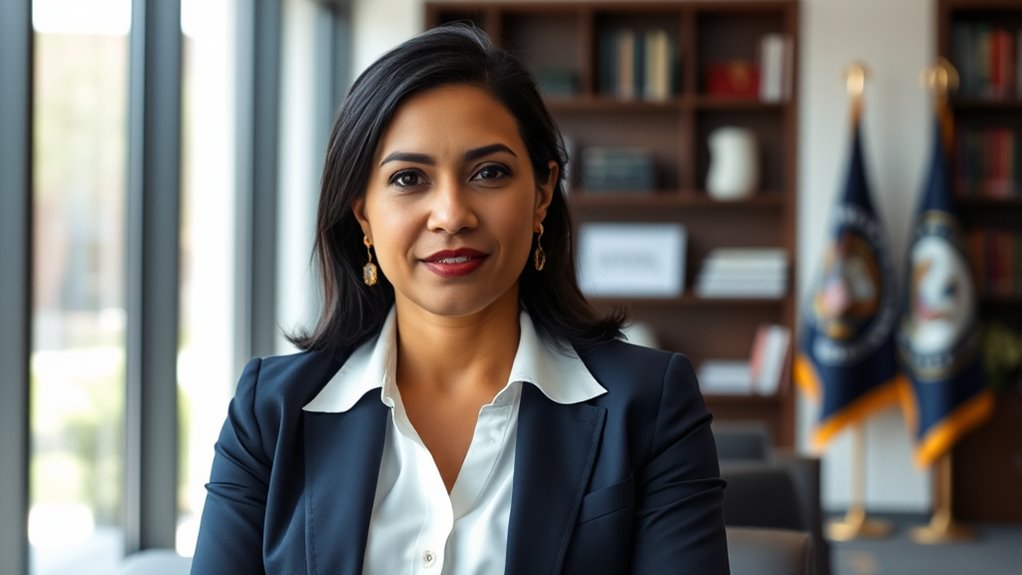
Tulsi Gabbard’s appointment as Director of National Intelligence marked a historic milestone, as she became the first female combat veteran to hold the position. President Trump announced her nomination on November 13, 2024, and the Senate confirmed her on February 12, 2025, by a close vote of 52-48. Before her confirmation, the Senate Intelligence Committee held a hearing on January 30, 2025, and advanced her nomination despite opposition from over 100 former security officials. Supporters, including veterans and national security groups, praised her integrity and military background. Critics questioned her lack of intelligence agency experience and pointed to her past foreign policy views. Still, her military service, congressional record, and efforts to depoliticize intelligence helped solidify her role in a challenging political environment.
Cultural Milestones and Legacy

How has Tulsi Gabbard’s career shaped the cultural landscape of American politics? You see, she broke barriers as the first Samoan and Hindu American in Congress, highlighting ethnic and religious diversity. Alongside Tammy Duckworth, she was among the first female combat veterans elected to Congress, inspiring representation for veterans and women. Her legislative efforts, like Talia’s Law and the Off Fossil Fuels Act, reflect her commitment to social justice and environmental issues. Gabbard’s military service, including deployments in Iraq and Kuwait, adds depth to her leadership image. Her political journey—from Honolulu City Council to national prominence—positions her as a leader for a younger generation, shaping cultural expectations of diversity, service, and advocacy in American politics. Her legacy endures in a more inclusive political landscape.
Frequently Asked Questions
What Are Tulsi Gabbard’s Current Policy Positions?
You want to know her current policy positions. She advocates for reducing nuclear risks by opposing first-use of nuclear weapons and promoting transparency in intelligence. She supports criminal justice reform, legalizing marijuana, and ending the war on drugs. She’s shifted toward conservative social views, opposing trans women in sports, and critiquing Biden policies. Additionally, she emphasizes supporting disabled individuals through education and employment initiatives, aiming to strengthen protections and promote inclusivity.
How Has Her Military Background Influenced Her Intelligence Approach?
Your military background deeply shapes your intelligence approach by giving you a strategic perspective on global conflicts and security. You assess risks accurately, especially in high-pressure situations, and understand the realities of combat. Your experience working with diverse military units and international partners improves collaboration. This background helps you make informed decisions, prioritize national security, and navigate complex threats with confidence rooted in firsthand military service.
What Controversies Has She Faced During Her Career?
You should know that her career is filled with controversies, including her opposition to LGBTQ+ rights, which drew criticism from progressives. She expressed skepticism about Syrian chemical attacks, challenging mainstream narratives and angering many. Her shift from Democrat to Republican and endorsement of Trump raised questions about her consistency. Additionally, she’s accused of spreading misinformation, especially claims linked to Russian propaganda, which led to serious scrutiny during her intelligence confirmation hearings.
How Does Her Shift to the Republican Party Affect Her Legacy?
Imagine her legacy hanging in the balance as she shifts sides. Your perception shifts, too, as her move to the Republican Party sparks debate. Will she be seen as a principled maverick or an opportunist? Her reevaluation, influenced by her new alliances, challenges her previous stances, stirring controversy. This transformation shapes how history will remember her—either as a bold outsider or a political chameleon.
What Are Her Future Political Ambitions Beyond DNI?
You see her future ambitions likely involve shaping U.S. foreign policy, pushing for reforms in national security, and expanding her influence within the conservative movement. She might run for higher office, leverage her role to influence election integrity issues, or seek leadership positions within the Republican Party. By maintaining strong ties with Trump allies and conservative groups, she aims to stay a significant voice in national security and political debates.
Conclusion
Like a river that carves new paths through uncharted territory, Tulsi Gabbard’s journey shows that even the strongest currents can change course. Her evolving beliefs and bold leadership remind you that true strength lies in steering the currents of change, forging your own way amid shifting tides. In her story, you see that courage to transform isn’t just about reaching new destinations but about embracing the journey itself with resilience and purpose.










